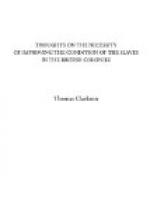Having carried my examination into the conduct of the Negroes after their liberation to 1802, or to the invasion of the island by Leclerc, I must now leave a blank for nearly two years, or till the year 1804. It cannot be expected during a war, in which every man was called to arms to defend his own personal liberty, and that of every individual of his family, that we should see plantations cultivated as quietly as before, or even cultivated at all. But this was not the fault of the emancipated Negroes, but of their former masters. It was owing to the prejudices of the latter, that this frightful invasion took place; prejudices, indeed, common to all planters, where slavery obtains, from the very nature of their situation, and upon which I have made my observations in a former place. Accustomed to the use of arbitrary power, they could no longer brook the loss of their whips. Accustomed again to look down upon the Negroes as an inferior race of beings, or as the reptiles of the earth, they could not bear, peaceably as these had conducted themselves, to come into that familiar contact with them, as free labourers, which the change of their situation required. They considered them, too, as property lost, but which was to be recovered. In an evil hour, they prevailed upon Buonaparte, by false representations and promises of pecuniary support, to restore things to their former state. The hellish expedition at length arrived upon the shores of St. Domingo:—a scene of blood and torture followed, such as history had never before disclosed, and compared with which, though planned and executed by Whites[12], all the barbarities said to have been perpetrated by the insurgent Blacks of the North, amount comparatively to nothing. In fine, the French were driven from the island. Till that time, the planters retained their property, and then it was, but not till then, that they lost their all; it cannot, therefore, be expected, as I have said before, that I should have any thing to say in favour of the industry or good order of the emancipated Negroes, during such a convulsive period.
In the year 1804, Dessalines was proclaimed emperor of this fine territory. Here I resume the thread of my history, (though it will be but for a moment,) in order that I may follow it to its end. In process of time, the black troops, containing the Negroes in question, were disbanded, except such as were retained for the peace-establishment of the army. They, who were disbanded, returned to cultivation. As they were free when they became soldiers, so they continued to be free when they became labourers again. From that time to this, there has been no want of subordination or industry among them. They or their descendants are the persons, by whom the plains and valleys of St. Domingo are still cultivated, and they are reported to follow their occupations still, and with as fair a character as other free labourers in any other quarter of the globe.




